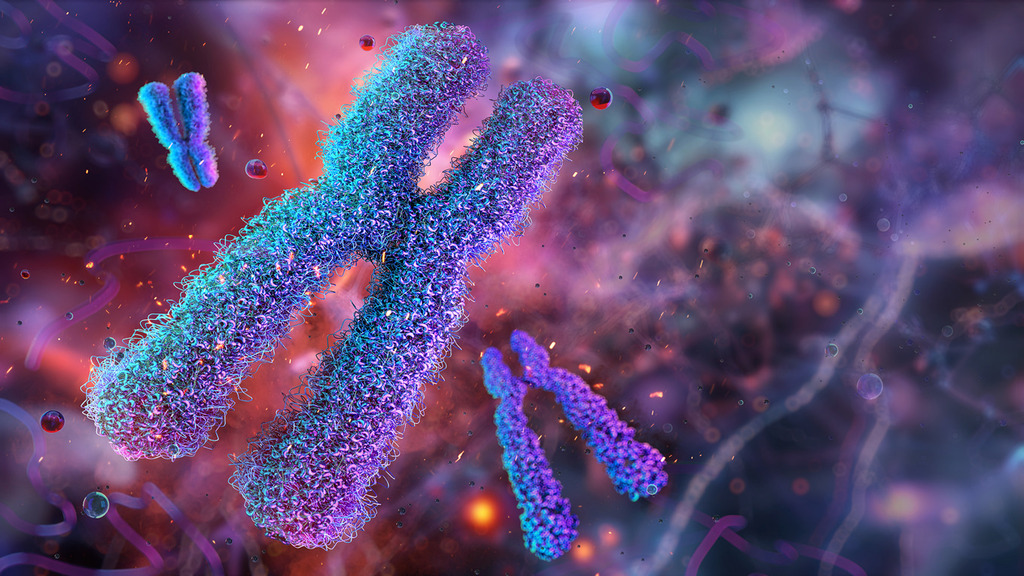
Gene on the X chromosome may help explain high multiple sclerosis rates in women
www.livescience.com
Nov. 29, 2025, 2:52 p.m.
A gene on the X chromosome revs up inflammation in the female brain, which may explain why rates of multiple sclerosis are higher in women than in men, scientists suggest.
Share on

CAR-T cells drive into progressive multiple sclerosis
www.nature.com
Nov. 29, 2025, 2:51 p.m.
Progressive multiple sclerosis (PMS) is a chronic inflammatory autoimmune disease of the central nervous system (CNS) characterized by relentless progression and limited treatment options. Recent studies have highlighted the role of B cells and plasma cells in driving PMS but current therapies face challenges in targeting cells within the CNS. Now, writing in Cell, Qin et al. present a first-in-human study of anti-B cell maturation antigen (BCMA) chimeric antigen receptor T (CAR-T) cell therapy in five patients with PMS, showing a favourable safety profile and potential therapeutic benefits.
Share on

Pourquoi la sclérose en plaque touche-t-elle surtout les femmes ?
www.nationalgeographic.fr
Nov. 29, 2025, 2:46 p.m.
Près de deux millions de personnes dans le monde souffrent de cette maladie invalidante. Les symptômes varient énormément, et il n'y a aucun remède connu à ce jour.
Share on

Ce virus auquel 90% de la population est exposé avant 40 ans favoriserait le développement d'une sclérose en plaque
www.science-et-vie.com
Nov. 29, 2025, 2:45 p.m.
Pendant des décennies, les scientifiques ont accumulé des indices pointant vers le virus Epstein-Barr. Présent dans l’organisme de plus de 90% des adultes à travers le monde, ce virus de la famille des herpès est connu pour provoquer la mononucléose infectieuse. Or, plusieurs études avaient déjà observé une surreprésentation de cette infection dans les antécédents des patients atteints de sclérose en plaques. La corrélation intrigue, mais reste difficile à interpréter tant le virus circule largement dans la population générale.
Share on

Towards primary prevention of multiple sclerosis
www.nature.com
Nov. 29, 2025, 1:55 p.m.
Multiple sclerosis (MS) is among the most common causes of disability in the young and, despite the advent of highly effective disease-modifying therapies, remains an incurable disease. Prevention of MS before the onset of demyelination is a feasible, albeit ambitious, goal. Currently, preventive interventions with adequate evidence of efficacy are lacking, and evaluating such interventions with traditional trial designs is challenging. Additionally, the high frequency and low effect sizes of putative MS risk factors, a limited window of opportunity to intervene, and the relatively low incidence of MS in the general population make prevention studies conceptually and practically difficult.
Share on

Does MS Always Progress?
www.getlabtest.com
Nov. 29, 2025, 1:54 p.m.
While MS is a chronic condition, its progression isn't uniform or predictable. Some people experience minimal progression over many years, while others may face more rapid changes. Let's explore the factors that influence MS progression and what current research tells us about managing the condition.
Share on

Advancing Primary Prevention Strategies for Multiple Sclerosis
bioengineer.org
Nov. 29, 2025, 1:52 p.m.
Multiple sclerosis (MS) stands out as one of the most prevalent causes of disability among young adults, placing immense pressure on healthcare systems and affecting the quality of life for those affected. Despite advancements in therapies that modify the course of the disease, MS has yet to be declared curable. This presents an ongoing challenge for researchers and clinicians alike. The focus is now shifting toward the ambitious—but indeed feasible—goal of preventing MS before any symptoms or demyelination occur. However, the path to achieving this presents numerous methodological challenges that call for innovative thinking.
Share on
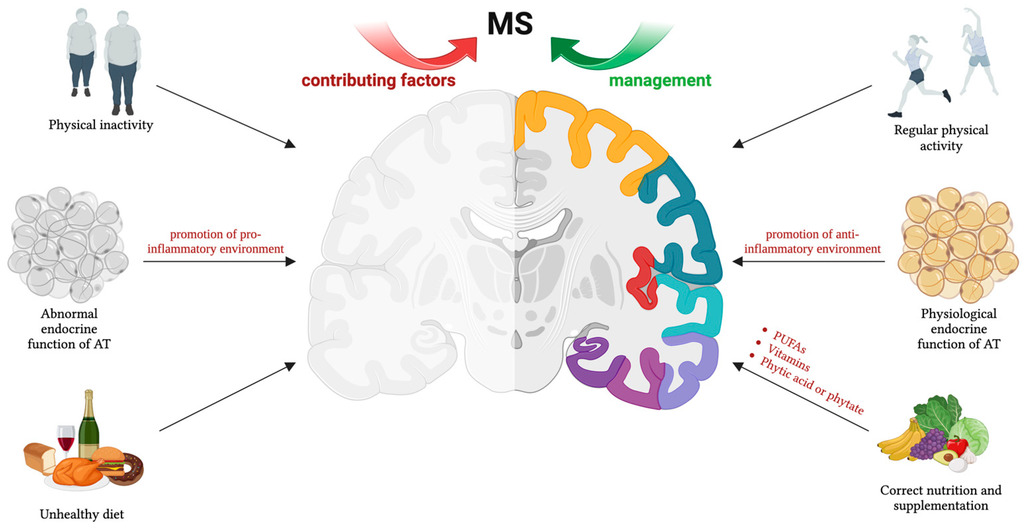
Impact of Lifestyle Interventions on Multiple Sclerosis: Focus on Adipose Tissue
www.mdpi.com
Sept. 16, 2024, 11:15 a.m.
MS is a chronic autoimmune disease affecting the CNS over a long-term period. The severity of MS varies widely and is influenced by several factors, comprising the endocrine activity of AT. The involvement of AT in MS pathogenesis remains to be further clarified; certainly, MS is characterized by an altered immune response in which AT also participates through dysregulated adipokine secretion, increasing the risk of disease development and accelerating its progression. Based on the data presented in this review, it is plausible that the functionality of AT is positively influenced by lifestyle factors such as physical activity and nutrition, which are essential in the management of MS.
Share on
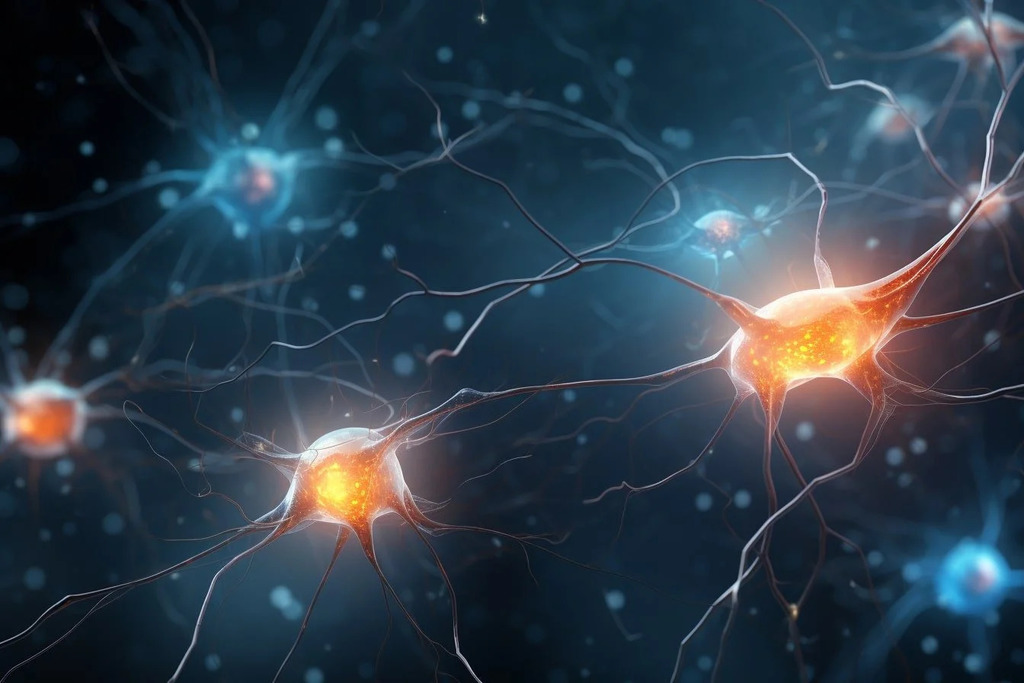
Unlocking Myelin Regeneration
neurosciencenews.com
Sept. 2, 2023, 3:30 p.m.
Researchers revealed a pivotal mechanism in myelin repair and regeneration, focusing on the Daam2 protein and CK2α kinase. Myelin, critical for efficient neurotransmission, when damaged leads to serious neurological diseases. Their findings spotlight the Wingless (Wnt) signaling pathway, crucial for myelin regeneration. Unveiling how Daam2 inhibits myelination, this study offers hope for untreatable neurological conditions.

Découverte du premier variant génétique qui aggrave la sclérose en plaques
www.sciencesetavenir.fr
June 29, 2023, 5:26 a.m.
Pour la première fois, un élément crucial de la progression de la maladie vient d'être mis au jour : le premier variant génétique associé à une sévérité accrue de la sclérose en plaques. Dans l'ADN, les variants sont des changements permanents sur les gènes. On les appelle des "polymorphismes" lorsque ces changements sont fréquents dans la population ou des "mutations" lorsque le changement est rare. Peu importe leur nature, les variants, de par les modifications qu'ils entraînent dans l'ADN, peuvent être à l'origine de maladies.
Share on

Des chercheurs découvrent un moyen potentiel de stopper l’inflammation à l’origine de la sclérose en plaques
trustmyscience.com
March 19, 2023, 9:39 a.m.
Alors que la sclérose en plaques demeure aujourd’hui incurable, une équipe de neuroscientifiques de l’Université de Virginie a fait une découverte majeure, qui pourrait changer la vie des malades. Ils ont en effet identifié le récepteur cellulaire qui provoque la réponse auto-immune et la neuroinflammation caractéristiques de la maladie. Il pourrait s’agir d’une nouvelle cible de choix pour la mise au point de nouveaux traitements.
Share on

Sclérose en plaques : l'autogreffe reconstitue le système immunitaire
www.sciencesetavenir.fr
Dec. 26, 2022, 12:53 p.m.
La progression de cette maladie du système nerveux central peut être freinée grâce une transplantation de cellules souches sanguines, avec environ 80 % d'efficacité. Pourtant, ce traitement reste négligé en France. Ses détracteurs pointent la lourdeur du dispositif et son coût. Explications.
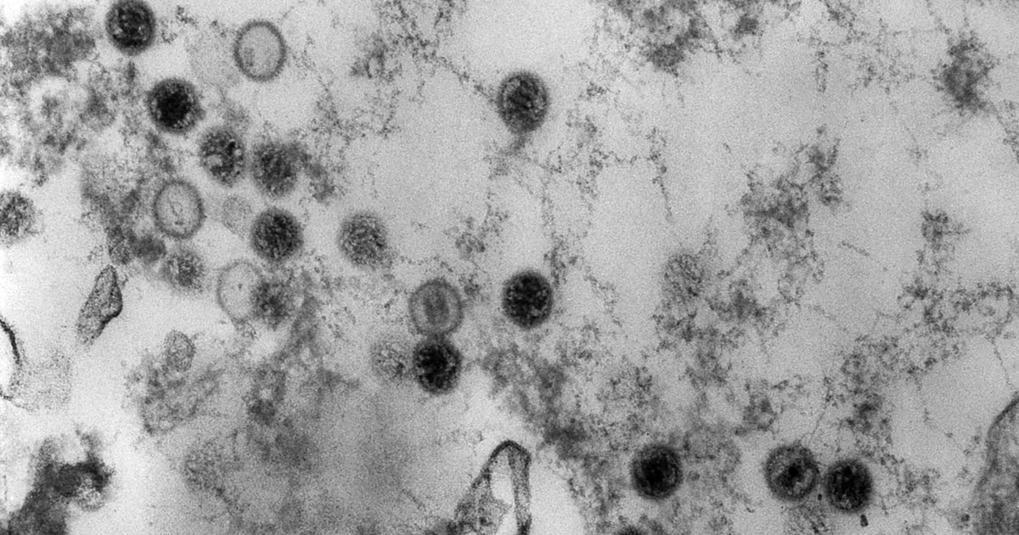
A groundbreaking finding on multiple sclerosis is dividing scientists
www.inverse.com
Nov. 28, 2022, 11:12 p.m.
A recent study offers the strongest evidence yet of the link between the Epstein-Barr virus and MS. Not everyone is convinced.
Share on

Alcohol inhibits the metabolism of dimethyl fumarate to the active metabolite responsible for decreasing relapse frequency in the treatment of multiple sclerosis
journals.plos.org
Nov. 28, 2022, 11:11 p.m.
Consistent with the incubation studies, the mouse pharmacokinetic study demonstrated that alcohol decreased the maximum concentration and area-under-the-curve of MMF in the plasma and the brain after dosing with DMF. We conclude that alcohol may markedly decrease exposure to the active MMF metabolite in the plasma and brain potentially decreasing the effectiveness of DMF in the treatment of RRMS.
Share on

Brainomix teams up with Pixyl to offer multiple sclerosis solution
www.nsmedicaldevices.com
Nov. 28, 2022, 11:09 p.m.
Brainomix will distribute Neuro.MS, Pixyl’s Software as a Service (SaaS) solution for diagnosis and treatment of patients with multiple sclerosis (MS), exclusively in the UK and Ireland, the Nordics and key markets across Eastern Europe
Share on

A physical therapist reflects on her multiple sclerosis diagnosis
www.statnews.com
Nov. 28, 2022, 11:08 p.m.
A little under 10 years ago, Leigh Krauss was almost done with her schooling to become a physical therapist. A former guard on the women’s basketball team at Trinity College in Hartford, Conn., she had always been active and healthy. That is, until one day, walking to class, she lost vision in one eye. Krauss was soon diagnosed with multiple sclerosis, a chronic autoimmune disease where nervous system glitches cause a disconnect between the brain and the body.
Share on

The Impact Of Multiple Sclerosis On The Body
dralexjimenez.com
July 29, 2022, 10:32 a.m.
Everyone knows that the brain is the command center of the body. This organ is part of the central nervous system that works with the spinal cord and the vital organ systems to send signals that provide motor-sensory functions to make the body do everyday movements. The signals from the brain have a casual relationship with the immune system. When environmental factors enter the body, the brain signals the immune system to send inflammatory cytokines to the area where it was affected and begin the body’s healing process. The immune system helps clean up the body’s cellular structure by replacing old, damaged cells with new, healthy cells. However, when the immune system starts to attack specific parts of the body mistakenly, it can damage the healthy cells causing autoimmune diseases to develop in the body.
Share on
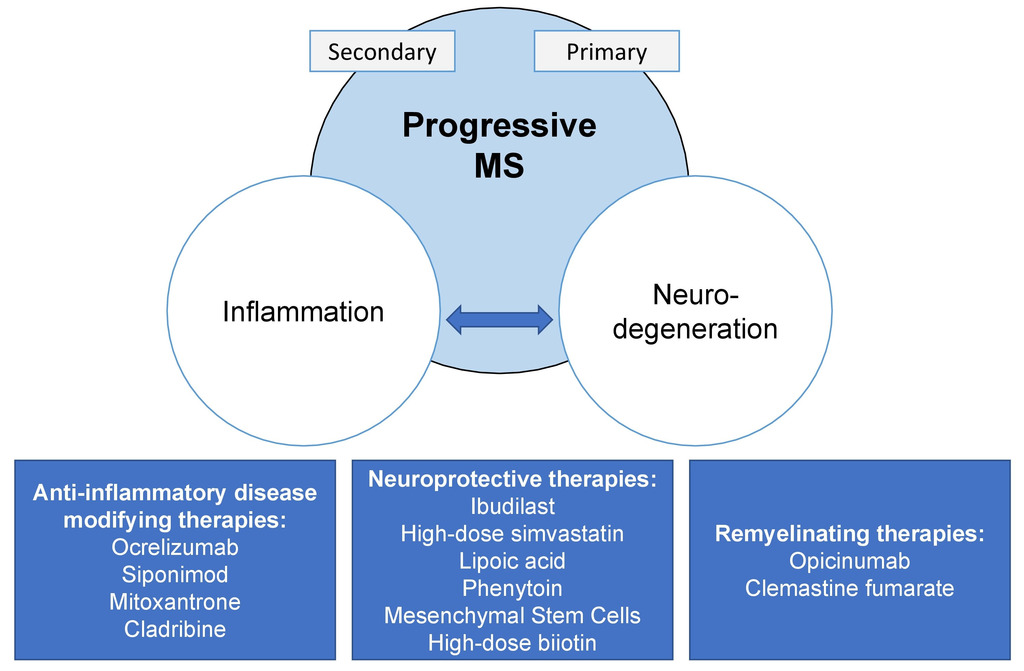
Disease-Modifying Treatments and Time to Loss of Ambulatory Function in Patients With Primary Progressive Multiple Sclerosis
jamanetwork.com
July 29, 2022, 10:30 a.m.
Results of this comparative effectiveness research study suggest that inflammation also occurs in patients with PPMS, may contribute to long-term disability, and may be associated with a reduced risk of becoming wheelchair dependent by current licensed DMTs.
Share on

Merck Sues Accord Healthcare for Patent Infringement of “Bioequivalent” Multiple Sclerosis Drug
lawstreetmedia.com
July 29, 2022, 10:27 a.m.
Merck’s ‘903 and ‘947 patent are both entitled “Cladribine Regimen for Treating Multiple Sclerosis,” which have been used to produce 10 mg cladribine tablets known as Mavenclad, the complaint said. The patents are listed alongside this drug in the FDA’s “Orange Book” of approved drugs.
Share on
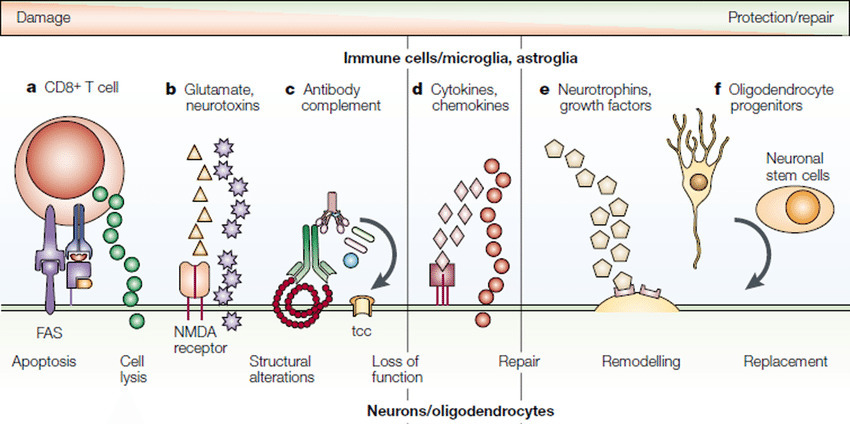
Molecular Basis of Multiple Sclerosis Development and Treatment
www.mdpi.com
July 29, 2022, 10:26 a.m.
The progress that has been made in developing new immune-modifying therapies for MS in recent years is fascinating. Nevertheless, all current drugs fail to prevent neurodegeneration. Moreover, not only are the molecular and cellular mechanisms underlying their effects not completely characterized, but the specificity also needs to be improved in order to spare the protective cellular subtypes.
Share on